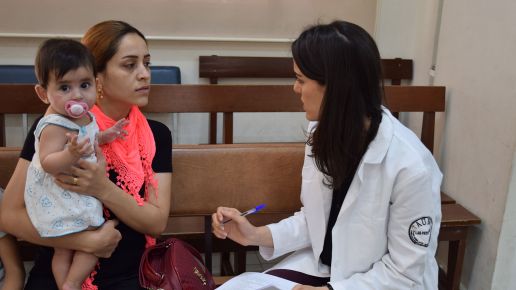Joint research to combat hunger
One of the greatest challenges of our time is to secure an adequate supply of food for the next decades. The University of Hohenheim is working with seven partner universities worldwide to find solutions.

Hunger was a pressing global problem even before the corona pandemic flared up. War and conflicts, droughts and floods, and a growing global population are among the reasons why hundreds of millions of people still do not have enough to eat in the 21st century. The corona pandemic is exacerbating the situation and could give rise to new large-scale famines.
Since 2009, the “Food Security Center” (FSC) at the University of Hohenheim has been addressing the fundamental problem of how to provide sufficient nutritious food for everyone. Its goal is to shed light on the issue, which has many different causes and manifests itself in many different ways, from a variety of scientific perspectives and to devise long-term strategies to combat it.
Partners from every continent
What is special about its approach is that the FSC constitutes the heart of a global scientific network comprising researchers from every continent. Universities from Ethiopia, Benin, Costa Rica, Kenya, Lebanon, Thailand and the Philippines are involved.
The scientists engage in exchange, work on joint research projects and profit from each other’s findings. They conduct research into the availability, quality and use of foodstuffs and share their results with politicians. They are specialists in the areas of agriculture, natural science and economics. The role that gender plays in the provision of food is explored, as is the impact of climate change on the availability of food and the potential offered by edible insects.
New leaders in the Global South
Furthermore, the FSC supports young researchers from developing countries – not only by assisting them in their work but also by making grants available for doctoral students. “We are training the leaders of the future to tackle the issue of food security in the Global South”, is how Nicole Schönleber from the FSC describes the objective. The centre has already produced a large number of successful young researchers.
Many of them would not have been able to pursue the academic careers they are now embarking on without this support: once she completes her doctoral thesis, for example, Memuna Kadie Sawi will be the first female lecturer with a PhD to teach at her home institute at Njala Universität in Sierra Leone. She is researching how the diet of infants could be improved by feeding them micronutrients. To this end, she is studying the eating habits of mothers and children and analysing the nutritional value of locally available fruit and vegetables

Others have won prizes, like Joana Abou-Rizk from Lebanon, whose research on breastfeeding and migration was recognised by the Barilla Foundation. Abou-Rizk is studying the dietary situation of mothers and children in Lebanon – looking at both the local population and refugees. Her work focuses particularly on anaemia and its causes. “The FSC’s excellent scholarship programme played an important role for me as a woman from the Middle East, especially in helping me launch my academic career”, she explains. All in all, the academics profit from a successful combination of knowledge transfer, exchange and funding in a highly topical field of study.
Networks for sustainable development
The FSC is actually a network within a network, for it is a member of an even larger alliance: the exceed programme. This involves the DAAD, drawing on funds from Germany’s Federal Ministry for Economic Cooperation and Development (BMZ), supporting twelve international higher education networks, each with a different specialist focus. Together, they maintain many dozen partnerships around the world.
They conduct research in the areas of health, employment, water management and renewable energies. The networks cooperate not only with their respective partners, but also with one another. Their research makes an important contribution to the Sustainable Development Goals. Dr Maria Flachsbarth, state secretary at the BMZ, describes the benefits as follows: “In this way, challenges relevant to development policy are jointly identified and solutions found, entirely in line with the 2030 Agenda.”
